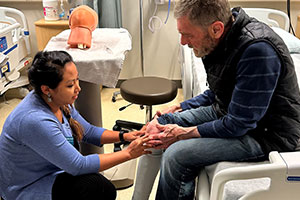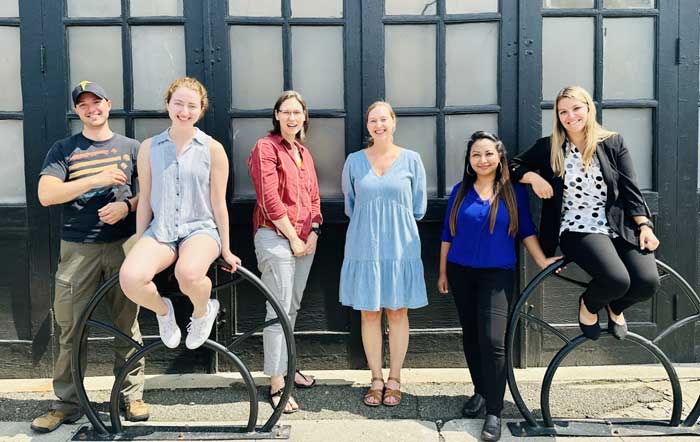Premera Rural Nursing Health Initiative at the University of Washington
- Need: To create rural clinical placement and postgraduate fellowship opportunities for Doctor of Nursing Practice (DNP) students and recent Advanced Registered Nurse Practitioner (ARNP) graduates in Washington.
- Intervention: The Rural Nursing Health Initiative (RNHI), a program out of the University of Washington School of Nursing that created clinical placement opportunities for DNP students and a postgraduate fellowship program for ARNP graduates.
- Results: Rural clinical stipends have been awarded to 80 DNP students, and 12 ARNPs completed rural fellowships between 2021 and 2023.
Description
The Rural Nursing Health Initiative (RNHI), a program based out of the University of Washington (UW) School of Nursing, aims to create primary care training opportunities in rural communities across Washington state through two different tracks.
The first track provides rural clinical placement opportunities to Doctor of Nursing Practice (DNP) students. The DNP preceptorship program is targeted toward students specializing in primary care, with most being family nurse practitioners, psychiatric mental health nurse practitioners, and adult gerontology nurse practitioners. Students are selected through a competitive application process that is open to students at Gonzaga University, Washington State University, Pacific Lutheran University, Seattle Pacific University, Seattle University, and UW.

The RNHI also offers a rural postgraduate fellowship program for recent Advanced Registered Nursing Practitioner (ARNP) graduates. Postgraduate fellowships are paid and last one year at rural sites across the state.
The RNHI program is funded by a five-year grant from the Premera Blue Cross Social Impact program. The original grant covered funding through the end of 2023, but the RNHI program has been approved for a no-cost extension to stretch funding through the end of 2025.
Services offered
Roughly 20 students a year participate in the rural preceptorship program, with the RNHI providing financial support for travel and housing and a financial incentive for the rural clinical sites. Students receive a $10,000 stipend to help cover living expenses, while clinical sites receive a $4,000 stipend for each student placed there. Clinical placements last one quarter or semester.
Graduates in the fellowship program are hired by and paid a salary by the site, which receives a $20,000 stipend from the RNHI to offset some of the expense. Throughout their one-year residency, fellows participate in weekly didactics, in which they explore a variety of complex, care-based clinical topics relevant to their rural primary care settings; attend a UW Continuing Nursing Education (CNE) primary care conference; and visit the University of Washington Simulation Center to participate in skills workshops. The program also provides support to preceptors, including offering a faculty development series.
Results
Rural clinical stipends have been awarded to 80 DNP students from six universities across the state, and 12 ARNP graduates completed rural fellowships between 2021 and 2023. Forty-seven rural primary care clinical sites in 21 counties have hosted students or fellows.
Since the start of the program, preceptors have provided more than 50,000 rural clinical hours to students and fellows. Six of the eight fellows in the most recent cohort chose to stay and work at their fellowship sites after the program had ended.

Challenges
Finding housing for students and fellows has been a challenge in some rural communities. Some students have worked around housing shortages by commuting from different communities. Program leaders have also needed to form relationships with rural providers, especially in smaller clinics where providers have less time and fewer resources, to assure them that the additional work involved in being a preceptor is worth the investment.
Replication
Program leaders say collaborating with other DNP programs in the state, rather than limiting the program to only UW students, has been vital to the RNHI's success. Additionally, the postgraduate fellowship program is open to newly graduated nurse practitioners from across the country, not only those who went to school in Washington.
A partnership with UW's Center for Health Workforce Studies has also been beneficial, as center researchers have been able to conduct surveys and interviews to track program outcomes.
Contact Information
Premera Rural Nursing Health Initiative at the University of Washingtonpremerarnhi@uw.edu
Topics
Health workforce education and training
· Nurse practitioners and other advanced practice registered nurses
· Nurses
· Primary care
· Recruitment and retention of health professionals
States served
Washington
Date added
January 8, 2024
Suggested citation: Rural Health Information Hub, 2024 . Premera Rural Nursing Health Initiative at the University of Washington [online]. Rural Health Information Hub. Available at: https://www.ruralhealthinfo.org/project-examples/1131 [Accessed 23 February 2026]
Please contact the models and innovations contact directly for the most complete and current information about this program. Summaries of models and innovations are provided by RHIhub for your convenience. The programs described are not endorsed by RHIhub or by the Federal Office of Rural Health Policy. Each rural community should consider whether a particular project or approach is a good match for their community’s needs and capacity. While it is sometimes possible to adapt program components to match your resources, keep in mind that changes to the program design may impact results.
